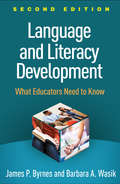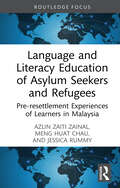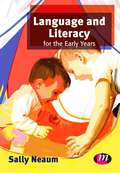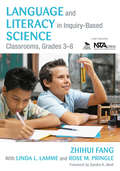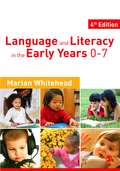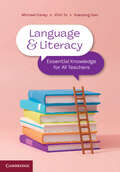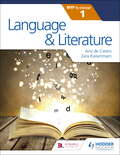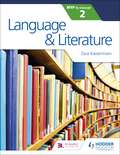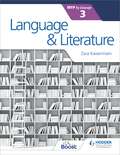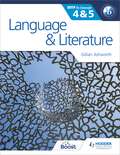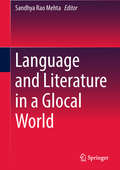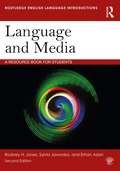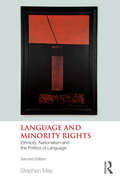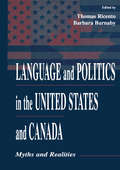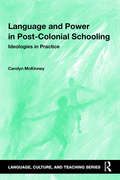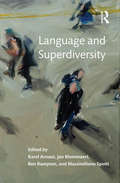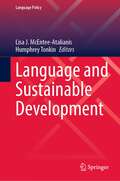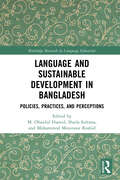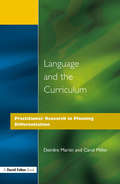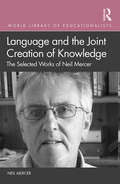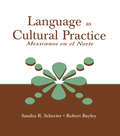- Table View
- List View
Language and Literacy Development, Second Edition: What Educators Need to Know
by James P. Byrnes Barbara A. WasikThis established text--now revised and updated--reveals how spoken language skills are acquired and how they affect children’s later reading and writing achievement. With a unique focus on the needs of educators, the book examines the foundations of language in the developing brain. It explores the relationship of language processes to core literacy skills and probes the impact of motivational and sociocultural factors on children’s learning. Implications of developmental knowledge for classroom instruction are highlighted, and effective practices reviewed. Revealing vignettes, clear explanations of research, and lists of “main ideas” enhance the text’s accessibility for preservice teachers. New to This Edition *Chapter on emergent literacy and the predictors of reading success. *Incorporates the latest research, including findings from key longitudinal studies. *Increased attention to English learners, low-income children, and children with disabilities. *Updated and expanded topics, including usage-based theories of language acquisition, morphological knowledge in vocabulary and comprehension, phonological processing skills, and writing development.
Language and Literacy Education of Asylum Seekers and Refugees: Pre-resettlement Experiences of Learners in Malaysia (Routledge Research in Educational Equality and Diversity)
by Meng Huat Chau Azlin Zaiti Zainal Jessica RummyThe educational experiences of youth refugees and asylum seekers during migration, cross-border movements, protracted displacements, and pre-resettlement phases have largely remained as a black box. Due to the lack of widespread studies on the existential crisis of this population group, our understanding of what transpires during these phases has been rather insubstantial. There are also concerns regarding the decision-making abilities of various stakeholders about pre-resettlement educational provisions for these youths, where the severity of their interrupted formal schooling would have been overlooked. Considering such occurrences, this monograph delves deep into the pre-resettlement educational experiences of a generation of untapped potential from the Myanmar Chin ethnic group in Malaysia, where we attempt to address existing concerns and emerging issues through longitudinal research, analysis, and a series of educational initiatives. This monograph uses an ecological framework to illustrate the complexity of the education ecosystem for refugee youths during phases of transition. It also highlights the significance of a safe, secured, and sustainable informal education system during crucial or emergency times. In particular, the book examines the language learning opportunities and literacy practices, within the premises of sociopolitical, socioeconomic, and sociocultural dynamics, which have shaped the agencies of these students and volunteer teachers who work with them. The monograph further provides recommendations for assisting refugee learners and volunteer teachers in language and literacy education. A multitude of other potential approaches to enhancing the language, literacy, and overall educational development of refugee youths are proposed, with a focus on empowering them as active agents in their learning journey. This book will be of interest to educators, language practitioners, academics, and stakeholders engaged in the provision and development of refugee education, especially in a pre-resettlement and transitional context.
Language and Literacy for the Early Years: 9780857257413 (Early Childhood Studies Series)
by Dr Sally Neaumhttp://www.uk.sagepub.com/repository/binaries/img/common/nurseryworld13.gif" width="175" height="152" border="0" align="right" /> Shortlisted for the 2013 Nursery World Awards! This is a focused text on early years' language and literacy for all students studying for degrees and foundation degrees in early childhood, early years and related disciplines and for candidates on EYPS pathways. It discusses language acquisition and development and covers development theory, talking with babies and the factors that affect development. Practical guidance on how to support children's language acquisition through rhymes, songs, story books and storytelling helps students see how theory links to practice. The text also examines the question 'what comes before phonics?' and includes interactive activities and theory focus features. About the Early Childhood Studies Series This series has been designed to support students of Early Years, Early Childhood Studies and related disciplines in popular modules of their course. Each text takes a focused look at a specific topic and approaches it in an accessible and user-friendly way. Features have been developed to help readers engage with the text and understand the subject from a number of different viewpoints. Activities pose questions to prompt thought and discussion and 'Theory Focus' boxes examine essential theory close-up for better understanding. This series is also applicable to EYPS candidates on all pathways. Other titles in the series include Early Childhood Studies, Childhood in Society for Early Childhood Studies, Child Development for Early Childhood Studies and Exploring Play for Early Childhood Studies.
Language and Literacy in Inquiry-Based Science Classrooms, Grades 3-8
by Zhihui Fang Linda L. Lamme Rose M. PringleThis hands-on resource offers a wealth of strategies aligned with national science education standards, including sample lessons for integrating reading instruction into inquiry-based science classrooms.
Language and Literacy in the Early Years 0-7
by Marian WhiteheadThis fourth edition of a text for childcare students reflects recent changes in the organization and regulation of early years care in the UK, including curriculum frameworks and related training initiatives. The book reviews competing theories of language acquisition and the development of children's verbal thinking, linking theory to practice with suggestions for providing an environment which builds on the strengths of young children. Part 1 describes contemporary approaches to the study of communication and language. An introduction to modern linguistics is followed by chapters on sociolinguistics, early language acquisition, and language and thinking. Part 2 covers literacy, with chapters on narrative and storytelling, the world of literature, and early representation and emerging writing. Boxes highlight exemplary programs, literary forms, specific titles, and examples from the classroom. Final chapters in each section relate the previous material to planning and provision for literacy development. Each individual chapter also includes specific teaching suggestions for the practitioner. The book is illustrated with b&w classroom photos and examples of children's early mark-making, and includes chapter key terms, concepts, and summaries. It also lists key texts, children's literature titles, DVDs, and websites. Whitehead is an independent consultant. Annotation ©2011 Book News, Inc. , Portland, OR (booknews. com)
Language and Literacy: Essential Knowledge for All Teachers
by Xuesong Gao Michael Carey Vinh ToLiteracy is important foundational knowledge for all teaching areas and classroom settings. Language and Literacy covers the building blocks of literacy, as well as the developmental skills all pre-service and in-service teachers need to teach effectively and meaningfully across the Australian curriculum. Part one moves chronologically from the early years to the secondary years, covering phonological, phonemic and morphological awareness, word and sentence-level grammar, language use in social contexts, and a discussion on English language diversity and change. Part two introduces the metalanguage, content knowledge and teaching methods required to develop students' competence in vocabulary, text types and grammar, as well as oracy, reading, writing and critical literacy. Each chapter includes discussion points and further resources to engage students, with key terms linked to the comprehensive glossary. Written by experienced educators, Language and Literacy is an essential resource, offering a focused exploration of language and literacy knowledge for pre-service and in-service teachers.
Language and Literature for the IB MYP 1
by Ana De Castro Zara KaiserimamA concept-driven and assessment-focused approach to Language and Literature teaching and learning.- Approaches each chapter with statements of inquiry framed by key and related concepts, set in a global context- Supports every aspect of assessment using tasks designed by an experienced MYP educator- Differentiates and extends learning with research projects and interdisciplinary opportunities- Applies global contexts in meaningful ways to offer an MYP Language and Literature programme with an internationally-minded perspective
Language and Literature for the IB MYP 1
by Zara Kaiserimam Ana de CastroExam Board: IBLevel: MYPSubject: EnglishFirst Teaching: September 2016First Exam: June 2017Develop your skills to become an inquiring learner; ensure you navigate the MYP framework with confidence using a concept-driven and assessment-focused approach to Language and Literature presented in global contexts.- Develop conceptual understanding with key MYP concepts and related concepts at the heart of each chapter.- Learn by asking questions with a statement of inquiry in each chapter. - Prepare for every aspect of assessment using support and tasks designed by experienced educators.- Understand how to extend your learning through research projects and interdisciplinary opportunities.
Language and Literature for the IB MYP 2
by Zara KaiserimamA concept-driven and assessment-focused approach to Language and Literature teaching and learning.- Approaches each chapter with statements of inquiry framed by key and related concepts, set in a global context- Supports every aspect of assessment using tasks designed by an experienced MYP educator- Differentiates and extends learning with research projects and interdisciplinary opportunities- Applies global contexts in meaningful ways to offer an MYP Language and Literature programme with an internationally-minded perspective
Language and Literature for the IB MYP 2
by Zara KaiserimamA concept-driven and assessment-focused approach to Language and Literature teaching and learning.- Approaches each chapter with statements of inquiry framed by key and related concepts, set in a global context- Supports every aspect of assessment using tasks designed by an experienced MYP educator- Differentiates and extends learning with research projects and interdisciplinary opportunities- Applies global contexts in meaningful ways to offer an MYP Language and Literature programme with an internationally-minded perspective
Language and Literature for the IB MYP 3
by Zara Kaiserimam Gillian AshworthDevelop your skills to become an inquiring learner; ensure you navigate the MYP framework with confidence using a concept-driven and assessment-focused approach to Language and Literature presented in global contexts.- Develop conceptual understanding with key MYP concepts and related concepts at the heart of each chapter.- Learn by asking questions with a statement of inquiry in each chapter. - Prepare for every aspect of assessment using support and tasks designed by experienced educators.- Understand how to extend your learning through research projects and interdisciplinary opportunities.
Language and Literature for the IB MYP 3
by Zara Kaiserimam Gillian AshworthDevelop your skills to become an inquiring learner; ensure you navigate the MYP framework with confidence using a concept-driven and assessment-focused approach to Language and Literature presented in global contexts.- Develop conceptual understanding with key MYP concepts and related concepts at the heart of each chapter.- Learn by asking questions with a statement of inquiry in each chapter. - Prepare for every aspect of assessment using support and tasks designed by experienced educators.- Understand how to extend your learning through research projects and interdisciplinary opportunities.
Language and Literature for the IB MYP 4 & 5: By Concept (MYP By Concept)
by Gillian AshworthThe only series for MYP 4 and 5 developed in cooperation with the International Baccalaureate (IB)Develop your skills to become an inquiring learner; ensure you navigate the MYP framework with confidence using a concept-driven and assessment-focused approach to Language and Literature presented in global contexts.- Develop conceptual understanding with key MYP concepts and related concepts at the heart of each chapter.- Learn by asking questions with a statement of inquiry in each chapter. - Prepare for every aspect of assessment using support and tasks designed by experienced educators.- Understand how to extend your learning through research projects and interdisciplinary opportunities.
Language and Literature for the IB MYP 4 & 5: By Concept (MYP By Concept)
by Gillian AshworthThe only series for MYP 4 and 5 developed in cooperation with the International Baccalaureate (IB)Develop your skills to become an inquiring learner; ensure you navigate the MYP framework with confidence using a concept-driven and assessment-focused approach to Language and Literature presented in global contexts.- Develop conceptual understanding with key MYP concepts and related concepts at the heart of each chapter.- Learn by asking questions with a statement of inquiry in each chapter. - Prepare for every aspect of assessment using support and tasks designed by experienced educators.- Understand how to extend your learning through research projects and interdisciplinary opportunities.
Language and Literature in a Glocal World
by Sandhya Rao MehtaThis collection of critical essays investigates the intersections of the global and local in literature and language. Exploring the connections that exist between global forms of knowledge and their local, regional applications, this volume explores multiple ways in which literature is influenced, and in turn, influences, movements and events across the world and how these are articulated in various genres of world literature, including the resultant challenges to translation. This book also explores the way in which languages, especially English, transform and continue to be reinvented in its use across the world. Using perspectives from sociolinguistics, discourse analysis and semiotics, this volume focuses on diasporic literature, travel literature, and literature in translation from different parts of the world to study the ways in which languages change and grow as they are sought to be ‘owned’ by the communities which use them in different contexts. Emphasizing on interdisciplinary studies and methodologies, this collection centralizes both research that theorizes the links between the local and the global and that which shows, through practical evidence, how the local and global interact in new and challenging ways.
Language and Media: A Resource Book for Students (Routledge English Language Introductions)
by Rodney H. Jones Sylvia Jaworska Erhan AslanRoutledge English Language Introductions cover core areas of language study and are one-stop resources for students. Assuming no prior knowledge, books in the series offer an accessible overview of the subject, with activities, study questions, sample analyses, commentaries, and key readings—all in the same volume. The innovative and flexible 'two-dimensional' structure is built around four sections—introduction, development, exploration, and extension— which offer self-contained stages for study. Each topic can also be read across these sections, enabling the reader to build gradually on the knowledge gained. This revised second edition of Language and Media: Provides an accessible introduction and comprehensive overview of the major approaches and methodological tools used in the study of language and media. Focuses on a broad range of media and media content from more traditional print and broadcast media formats to more recent digital media formats. Incorporates practical examples using real data, including newspaper articles, press releases, television shows, advertisements (print, broadcast, and digital), blogs, social media content, internet memes, culture jamming, and protest signs. Includes key readings from leading scholars in the field, such as Jan Blommaert, Sonia Livingstone, David Machin, Martin Montgomery, Ruth Page, Ron Scollon, and Theo van Leeuwen. Offers a wide range of activities, questions, and points for further discussion. The book emphasises the increasingly creative ways ordinary people are engaging in media production. It also addresses a number of urgent current concerns around media and media production/reception, including fake news, clickbait, virality, and surveillance. Written by three experienced teachers and authors, this accessible textbook is an essential resource for all students of English language and linguistics.
Language and Minority Rights: Ethnicity, Nationalism and the Politics of Language (Language In Social Life Ser.)
by Stephen MayThe second edition addresses new theoretical and empirical developments since its initial publication, including the burgeoning influence of globalization and the relentless rise of English as the current world language. May’s broad position, however, remains largely unchanged. He argues that the causes of many of the language-based conflicts in the world today still lie with the nation-state and its preoccupation with establishing a 'common' language and culture via mass education. The solution, he suggests, is to rethink nation-states in more culturally and linguistically plural ways while avoiding, at the same time, essentializing the language-identity link. This edition, like the first, adopts a wide interdisciplinary framework, drawing on sociolinguistics, applied linguistics, sociology, political theory, education and law. It also includes new discussions of cosmopolitanism, globalization, the role of English, and language and mobility, highlighting the ongoing difficulties faced by minority language speakers in the world today.
Language and Politics in the United States and Canada: Myths and Realities
by Thomas Ricento Barbara BurnabyThis volume critically analyzes and explains the goals, processes, and effects of language policies in the United States and Canada from historical and contemporary perspectives. The focus of this book is to explore parallel and divergent developments in language policy and language rights in the two countries, especially in the past four decades, as a basis for reflection on what can be learned from one country's experience by the other. Effects of language policies and practices on majority and minority individuals and groups are evaluated. Differences in national and regional language situations in the U.S. and Canada are traced to historical and sociological, demographic, and legal factors which have sometimes been inappropriately generalized or ignored by ideologues. The point is to show that certain general principles of economics and sociology apply to the situations in both countries, but that differing notions of sovereignty, state and nation, ethnicity, pluralism, and multiculturalism have shaped attitudes and policies in significant ways. Understanding the bases for these varying attitudes and policies provides a clearer understanding of the idiosyncratic as well as more universal factors that contribute to tensions between groups and to outcomes, many of which are unintended. The volume makes clear that language matters always involve issues of culture, economics, politics, individual and group identities, and local and national histories. The chapters provide detailed analyses on a wide range of issues at the national, state/provincial, and local levels in both countries. The chapter authors come from a variety of academic disciplines (education, geography, journalism, law, linguistics, political science, and sociology), and the findings, taken together, contribute to an evolving, interdisciplinary theory of language policy.
Language and Power in Post-Colonial Schooling: Ideologies in Practice (Language, Culture, and Teaching Series)
by Carolyn McKinneyCritiquing the positioning of children from non-dominant groups as linguistically deficient, this book aims to bridge the gap between theorizing of language in critical sociolinguistics and approaches to language in education. Carolyn McKinney uses the lens of linguistic ideologies—teachers’ and students’ beliefs about language—to shed light on the continuing problem of reproduction of linguistic inequality. Framed within global debates in sociolinguistics and applied linguistics, she examines the case of historically white schools in South Africa, a post-colonial context where political power has shifted but where the power of whiteness continues, to provide new insights into the complex relationships between language and power, and language and subjectivity. Implications for language curricula and policy in contexts of linguistic diversity are foregrounded. Providing an accessible overview of the scholarly literature on language ideologies and language as social practice and resource in multilingual contexts, Language and Power in Post-Colonial Schooling uses the conceptual tools it presents to analyze classroom interaction and ethnographic observations from the day-to-day life in case study schools and explores implications of both the research literature and the analyses of students’ and teachers’ discourses and practices for language in education policy and curriculum.
Language and Superdiversity: Recombining Spaces, Times And Language Practices (Encounters Ser. #7)
by Jan Blommaert Karel Arnaut Massimiliano Spotti Ben RamptonA first synthesis of work done in sociolinguistic superdiversity, this volume offers a substantial introduction to the field and the issues and state-of-the-art research papers organized around three themes: Sketching the paradigm, Sociolinguistic complexity, Policing complexity. The focus is to show how complexity rather than plurality can serve as a lens through which an equally vast range of topics, sites, and issues can be tied together. Superdiversity captures the acceleration and intensification of processes of social ‘mixing’ and ‘fragmentation’ since the early 1990s, as an outcome of two different but related processes: new post-Cold War migration flows, and the advent and spread of the Internet and mobile technologies. The confluence of these forces have created entirely new sociolinguistic environments, leading to research in the past decade that has brought a mixture of new empirical terrain–extreme diversity in language and literacy resources, complex repertoires and practices of participants in interaction–and conceptual challenges. Language and Superdiversity is a landmark volume bringing together the work of the scholars and researchers who spearhead the development of the sociolinguistics of superdiversity.
Language and Sustainable Development (Language Policy #32)
by Humphrey Tonkin Lisa J. McEntee-AtalianisThis book addresses the importance of language in matters of sustainability and incorporating such concerns in implementing the UN’s Sustainable Development Goals (SDGs). Sustainable language policy must aim to include all groups, including language minorities and marginalized populations, such as refugees and aid recipients, in conditions that allow for their inclusion in making and implementing policy. The book brings together nine studies covering such topics as language and digital resources, sustainable and inclusive multilingual education, national language policy, and language in peacekeeping operations. A final chapter addresses the crucial intersection between sociolinguistics and economics, and the implications of this for development and the SDGs.
Language and Sustainable Development in Bangladesh: Policies, Practices, and Perceptions (Routledge Research in Language Education)
by Shaila Sultana Mohammod Moninoor Roshid M. Obaidul HamidThis book examines relationships between language and sustainable development in the context of Bangladesh. Following inclusive and multidisciplinary perspectives, these relationships are explored in mainstream education, teacher education, religious education and indigenous, ethnic minority and refugee settings. The contexts of development are also diverse which include the public sector, international non-government organisations, domestic work, tourism, and the environment.The book records voices of people from various linguistic, social, cultural, and demographic backgrounds, in urban, rural, and peripheral settings. It makes the language question visible in the manifold contexts of development where it has generally remained invisible. Giving visibility to language by referring to the Sustainable Development Goals (SDGs), the chapters embrace language and development in pluralistic ways and underscore their complex but undeniable relationships. The authors come from diverse backgrounds and bring plurality of genres, methods, insights, and implications.The volume is intended for students, academics, researchers, policy personnel, language practitioners, and other readers whose works and interests straddle language, development, and SDGs. It will benefit them by explicating language-sustainable development relationships in theoretical as well as practical ways, suggesting directives for policies and practices for linguistic and social justice, and equity and inclusion.
Language and the Curriculum: Practitioner Research in Planning Differentiation
by Carol Miller Deirdre MartinFirst Published in 1999. Routledge is an imprint of Taylor & Francis, an informa company.
Language and the Joint Creation of Knowledge: The selected works of Neil Mercer
by Neil MercerIn the World Library of Educationalists series, international experts themselves compile career-long collections of what they judge to be their finest pieces – extracts from books, key articles, salient research findings, major theoretical and practical contributions – so the world can read them in a single manageable volume. Readers will be able to follow the themes and strands and see how their work contributes to the development of the field. Language and the Joint Creation of Knowledge draws on the most prominent writing of Neil Mercer, covering his ground-breaking and critically acclaimed work on the role of talk in education, and on the relationship between spoken language and cognition. The text explores key themes, relating theoretical ideas to research evidence and to practical educational situations that improve children’s lives. Offering students and researchers a clear, accessible and up-to-date account of a sociocultural perspective on the relationship between spoken language and cognition, it explains one of the key themes in Neil Mercer’s work – that humans have uniquely evolved the capacity to think together, or ‘interthink’. Offering a crucial insight into the work of Neil Mercer, this selection showcases why his approach has become the dominant paradigm in educational research, and why it is increasingly influential in the psychology of teaching and learning. This unique collection of published articles and chapters, which represent the key themes and range of his research over the last 40 years, will be of interest to all followers of his work and any reader interested in the role of language in education.
Language as Cultural Practice: Mexicanos en el Norte
by Sandra R. Schecter Robert J. BayleyLanguage as Cultural Practice: Mexicanos en el Norte offers a vivid ethnographic account of language socialization practices within Mexican-background families residing in California and Texas. This account illustrates a variety of cases where language is used by speakers to choose between alternative self-definitions and where language interacts differentially with other defining categories, such as ethnicity, gender, and class. It shows that language socialization--instantiated in language choices and patterns of use in sociocultural and sociohistorical contexts characterized by ambiguity and flux--is both a dynamic and a fluid process. The study emphasizes the links between familial patterns of language use and language socialization practices on the one hand, and children's development of bilingual and biliterate identities on the other. Using a framework emerging from their selection of two geographically distinct localities with differing demographic features, Schecter and Bayley compare patterns of meaning suggested by the use of Spanish and English in speech and literacy activities, as well as by the symbolic importance ascribed by families and societal institutions (such as schools) to the maintenance and use of the two languages. Language as Cultural Practice: *provides a detailed account of the diversity of language practices and patterns of use in language minority homes; *offers educators detailed information on the language ecology of Latino homes in two geographically diverse communities--San Antonio, Texas, and the San Francisco Bay Area, California; *shows the diversity within Mexican-American communities in the United States--families profiled range from rural families in south Texas to upper middle class professional families in northern California; *provides data to correct the prevalent misconception that maintenance of Spanish interferes with the acquisition of English; and *contributes to the study of language socialization by showing that the process extends throughout the lifetime and that it is an interactive rather than a one-way process. This book will particularly interest researchers and professionals in linguistics, anthropology, applied linguistics, and education, and will be useful as a text in graduate courses in these areas that address language socialization and learning.
